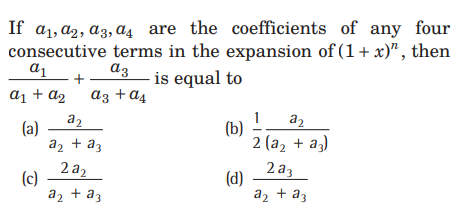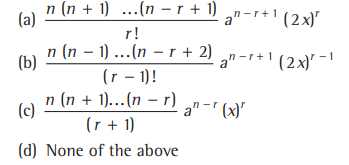Students can refer to the following Binomial Theorem MCQ Questions for Class 11 Maths with Answers provided below based on the latest curriculum and examination pattern issued by CBSE and NCERT. Our teachers have provided here a collection of multiple choice questions for Binomial Theorem Class 11 covering all topics in your textbook so that students can assess themselves on all important topics and thoroughly prepare for their exams
Binomial Theorem MCQ Questions for Class 11 Maths with Answers
We have provided below Binomial Theorem MCQ Questions for Class 11 Maths with answers which will help the students to go through the entire syllabus and practice multiple choice questions provided here with solutions. As Binomial Theorem MCQs in Class 11 Mathematics pdf download can be really scoring for students, you should go through all problems provided below so that you are able to get more marks in your exams.
Question: The value of(1.0025)10 correct to five decimal places is
(a) 1.025281
(b) 1.034285
(c) 1.005293
(d) None of these
Answer
A
Question: The ratio of the coefficient of x10 in (1-X2)10 ) and the term independent of x in (x-2/x)10 is
(a) 1 : 16
(b) 1 : 8
(c) 64 : 1
(d) 1: 32
Answer
D
Question: The term independent of x in the expansion of

Answer
A
Question: The number of terms which are free from radical signs in the expansion of(y1/5+x1/10)55 is
(a) 5
(b) 6
(c) 7
(d) 4
Answer
B
Question:

Answer
A
Question: (√2+1)6-(√2 -1)6)is equal to
(a) 101
(b) 70√2
(c) 140√2
(d) 120√2
Answer
C
Question:

Answer
D
Question: For all n ∈N,24n-15n-1is divisible by
(a) 225
(b) 125
(c) 325
(d) None of these
Answer
A
Question: If the coefficient of rth, (r+1)th and (r+ 2)th term in the expansion of (1+x)14 are in AP, then the value of r is
(a) 5 or 8
(b) 4 or 9
(c) 5 or 9
(d) 6 or 7
Answer
C
Question: C1+2C2+3C3+..+nCn is equal to
(a) (n-1)2n-1 (b) n2n-1
(c) n2n
(d) n2n-2
Answer
B
Question: If( r+1)th term is the first negative term in the expansion of(1+x) then the value of r is
(a) 5
(b) 6
(c) 4
(d) 7
Answer
A
Question:

Answer
C
Question: If x is so small that its square and higher powers may be neglected, then the value of (8+3x)2/3/(2+3x)4-5x)1/2is
(a) 1-3/2x
(b)1+5/8x
(c) 1-5/8x
(d) None of these
Answer
C
Question:

Answer
B
Question:

Answer
B
Question: The number of dissimilar terms in the expansion of
(a+b-c)2n-1-(a+b-c)2n+1 is
(a) (n+ 1)2
(b) (n-1)2
(c) 4n2-1
(d) None of these
Answer
A
Question: The total number of terms in the expansion of (x+a)100+(x-a)100 after simplification will be
(a) 202
(b) 51
(c) 50
(d) None of these
Answer
B
Question: The approximate value of(7.995)1/3correct to four decimal places is
(a) 1.9995
(b) 1.9996
(c) 1.9990
(d) 1.9991
Answer
B
Question: If (1+ax)n=1+8x+24x2+..,, then the values of a and n are
(a) 2, 4
(b) 2, 3
(c) 3, 6
(d) 1, 2
Answer
A
Question: The coefficient of xn in the expansion of(1+x)2n and (1+x)2n-1 are in the ratio
(a) 1:2
(b) 1:3
(c) 3:1
(d) 2:1
Answer
D
Question: By using the first three terms of its expansion , the approximate value of (0.99) 5 is
(a) 0.949
(b) 0.951
(c) 0.954
(d) None of these
Answer
B
Question: The coefficient of x4 in the expansion of

Answer
D
Question: The value of (1.002)12 up to fourth place of decimal is
(a) 1.0242
(b) 1.0245
(c) 1.0004
(d) 1.0254
Answer
A
Question: The coefficient of x5 in the expansion of

Answer
C
Question:

Answer
A
Question: In the expansion of the following expression

Answer
A
Question: If in the expansion of (1+x)m(1-x)n,) the coefficient of x and x2 are 3 and – 6 respectively, then m is
(a) 6
(b) 9
(c) 12
(d) 24
Answer
C
Question:

Answer
C
Question: If the coefficients of three consecutive terms in the expansion of (1+x)n are in the ratio 1: 7: 42, then the value of n is
(a) 60
(b) 70
(c) 55
(d) None of these
Answer
C
Question: In the polynomial(x-1) ) (x-2 ) (x-3 )…(x-100), the coefficient of x99 is
(a) 5050
(b) – 5050
(c) 100
(d) 99
Answer
B
Question: The digit at the unit place in the number 19 2005 +112005-9 2005 – is
(a) 2
(b) 1
(c) 0
(d) 8
Answer
B
Question: If the coefficients of p th, (p +1) th and ( p + 2) th terms in the expansion of (1 + x)n are in AP, then
(a) n2-2np+4p2=0
(b) n2-n(4p+1)+4p2-2=0
(c) n2-n(4p+1)+4p2=0
(d) None of the above
Answer
B
Question:

Answer
C
Question: If (+x-2x2)6=1+a1x+a2x2+..+a12x12,then the expression a2+a4+a6+…+a12 has the value
(a) 32
(b) 63
(c) 64
(d) None of these
Answer
D
Question:

Answer
A
Question:

Answer
C
Question: The rth term in the expansion of (a+2x)n ) is

Answer
B
Question: Given the integers, r>1, n > 2 and coefficients of (3)r th and ( r + 2) nd terms in the binomial expansion of (1+x)2n are equal, then
(a) n = 2r
(b) n = 3r
(c) n 2r + 1
(d) None of these
Answer
A
Question: The( r+1)th term in the expansion of(1-x)-4 will be
(a) xr/r!
(b) (r+1) (r+2) (r+3)/6 ) xr
(c) (r+2) (r+3)/2xr
(d) None of these
Answer
B
Question: The 4th term in the expansion of (x-2y)12 is
(a) 1760x3y9
(b) – 1760x9y3
(c) 1760x9y3
(d) None of these
Answer
B
Question: If the coefficients of x2and x3 in the expansion of (3+ax)9 are equal, then the value of a is
(a) 5/7
(b) 9/7
(c) 7/9
(d) – 9/7
Answer
B
Question: In the expansion of (1 +a)m+ n, the coefficients of a m and an are
(a) equal
(b) not equal
(c) do not say anything
(d) None of these
Answer
A
Question: If the coefficients of 2nd, 3rd and the 4th terms in the expansion of(1+ x)n are in AP, then value of n is
(a) 2
(b) 7
(c) 11
(d) 14
Answer
B
Question: The value of x in the expression (x+x log10x)5, , if the third term in the expansion is 1000000, is
(a) 10
(b) 11
(c) 12
(d) None of these
Answer
A
Question: If in the expansion of (a-2b)n, the sum of 4th and 5th term is zero, then the value of a/b is
(a) n – 4/5
(b) n – 3/2
(c) 5/n – 4
(d) 5/ 2(n -4)
Answer
B
Question: The two successive terms in the expansion of( 1+x)24 whose coefficients are in the ratio 1:4 are
(a) 3rd and 4th
(b) 4th and 5th
(c) 5th and 6th
(d) 6th and 7th
Answer
C
Question: The first 3 terms in the expansion of (1+ax)n(n≠0) are 1,6x and 16x2 .Then, the values of a and n are respectively
(a) 2 and 9
(b) 3 and 2
(c) 2/3and 9
(d) 3/2and 6
Answer
C

We hope you liked Binomial Theorem MCQ Questions for Class 11 Maths provided above. If you have any questions, please post them in the comments box below. Our teachers will provide a response